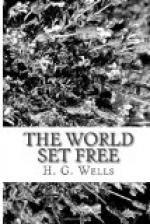The catastrophe of the atomic bombs which shook men out of cities and businesses and economic relations shook them also out of their old established habits of thought, and out of the lightly held beliefs and prejudices that came down to them from the past. To borrow a word from the old-fashioned chemists, men were made nascent; they were released from old ties; for good or evil they were ready for new associations. The council carried them forward for good; perhaps if his bombs had reached their destination King Ferdinand Charles might have carried them back to an endless chain of evils. But his task would have been a harder one than the council’s. The moral shock of the atomic bombs had been a profound one, and for a while the cunning side of the human animal was overpowered by its sincere realisation of the vital necessity for reconstruction. The litigious and trading spirits cowered together, scared at their own consequences; men thought twice before they sought mean advantages in the face of the unusual eagerness to realise new aspirations, and when at last the weeds revived again and ‘claims’ began to sprout, they sprouted upon the stony soil of law-courts reformed, of laws that pointed to the future instead of the past, and under the blazing sunshine of a transforming world. A new literature, a new interpretation of history were springing into existence, a new teaching was already in the schools, a new faith in the young. The worthy man who forestalled the building of a research city for the English upon the Sussex downs by buying up a series of estates, was dispossessed and laughed out of court when he made his demand for some preposterous compensation; the owner of the discredited Dass patents makes his last appearance upon the scroll of history as the insolvent proprietor of a paper called The Cry for Justice, in which he duns the world for a hundred million pounds. That was the ingenuous Dass’s idea of justice, that he ought to be paid about five million pounds annually because he had annexed the selvage of one of Holsten’s discoveries. Dass came at last to believe quite firmly in his right, and he died a victim of conspiracy mania in a private hospital at Nice. Both of these men would probably have ended their days enormously wealthy, and of course ennobled in the England of the opening twentieth century, and it is just this novelty of their fates that marks the quality of the new age.
The new government early discovered the need of a universal education to fit men to the great conceptions of its universal rule. It made no wrangling attacks on the local, racial, and sectarian forms of religious profession that at that time divided the earth into a patchwork of hatreds and distrusts; it left these organisations to make their peace with God in their own time; but it proclaimed as if it were a mere secular truth that sacrifice was expected from all, that respect had to be shown to all; it revived schools or set them up afresh all around the world, and everywhere




